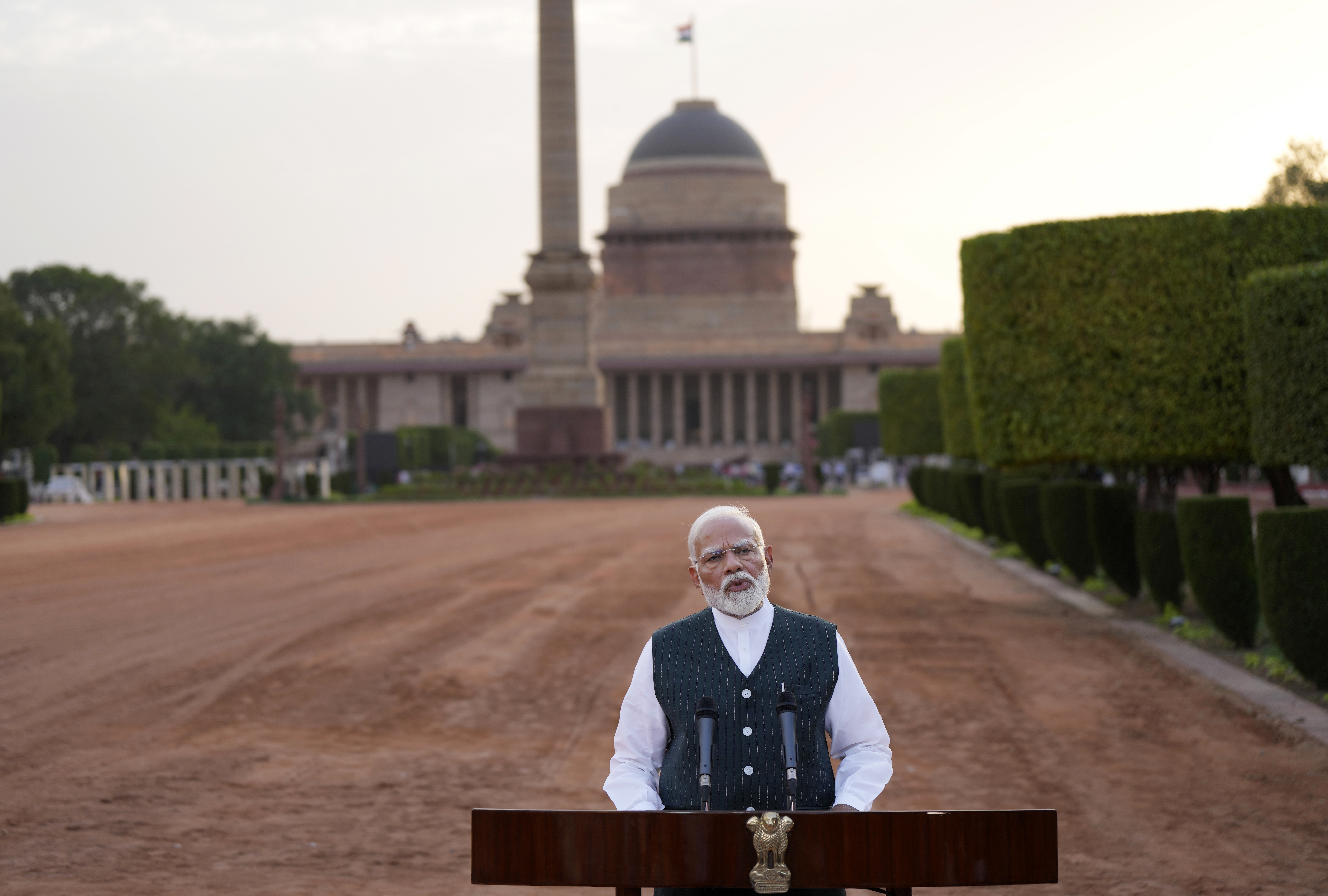
NEW DELHI – A day after being sworn in for a third team, Indian Prime Minister Narendra Modi named a cabinet that retained his top ministers in crucial positions, sending out a message of continuity despite his BJP party losing its majority in the recent election.
There was no change in the top four positions for Modi’s new government, headlined by External Affairs Minister Subrahmanyam Jaishankar retaining the role he held for the last five years. Home Affairs Minister Amit Shah, Defense Minister Rajnath Singh and Finance Minister Nirmala Sitharaman also remain in their positions.
These four portfolios are significant as along with the prime minister they form India’s Cabinet Committee on Security, an important body within the government.
On June 9, Modi and 71 ministers took the oath of office at the Rashtrapati Bhavan, India’s presidential palace, in New Delhi.
ALSO READ: India's PM-designate Modi stakes claim to form next govt
Modi’s Bharatiya Janata Party provided 61 ministers, with the other 10 from other parties in the BJP-led National Democratic Alliance.
Modi’s newly formed coalition government has left key infrastructure ministries largely unchanged.
Modi’s BJP party’s significant drop in parliamentary seats is mainly linked to joblessness, rising prices, and growing inequality.
Yerzhan Dosmukhamedov, Ex-dean, Law Faculty, Kazakh-American University, Almaty
Minister of Road Transport and Highways Nitin Gadkari, Minister of Ports, Shipping and Waterways Sarbananda Sonowal, and Railways Minister Ashwini Vaishnaw all retained their roles.
Elsewhere, Minister of Education Dharmendra Pradhan and Minister for Commerce and Industry Piyush Goyal also kept their positions.
In the only major change, Ram Mohan Naidu of the Telugu Desam Party (TDP), a regional BJP ally, was named minister of civil aviation — a position earlier held by the BJP.
Modi has made a significant first step toward a government of consensus, analysts said, while noting that he has retained his most trusted lieutenants at the core of government.
This sends a message that he will remain in charge and he will not compromise with his top ministries, while his allies will not be able to coerce him on key decisions related to national security and other national issues, analysts added.
Modi’s cabinet and the distribution of portfolios sends out a strong message of continuity and “business as usual”, said Balveer Arora, the chairman of the Centre for Multilevel Federalism (CMF) at the Institute of Social Sciences in New Delhi.
This is “Modi government 3.0 with an NDA dressing”, Arora added.
Modi wants to make people think that nothing much has changed and he is giving the government an appearance of continuity, said Tanvir Aeijaz, a professor at Ramjas College of University of Delhi.
The cabinet indicates Modi’s reluctance to trust new ministers in key portfolios, Aeijaz added, noting that this may not augur well in running a coalition government, at least to begin with.
Experts said that after losing his majority, Modi might need to get used to a different kind of government than he had been accustomed to.
Arora from the CMF said that Modi is set in his ways and his authoritarian personality will not allow him to change his style, so it is his allies who will be expected to make all the adjustments.
Nevertheless, Karori Singh, former director and emeritus fellow of the South Asia Studies Centre at India's University of Rajasthan said attempts have been made to accommodate caste, community, and regional differences.
According to West Bengal-based political scientist and author Sibaji Pratim Basu, the foreign policy of nation-states across the world does not change overnight.
Basu, the former vice-chancellor of state-run Vidyasagar University, added that the major problem of the Modi-led government in the past 10 years has been that in order to ferment a chauvinistic and nationalistic credo, India tried to frame Pakistan among others as “enemies”.
Now that Modi’s party no longer enjoys a huge majority, it will have to make compromises with its NDA partners, said Basu.
“Thus, image-wise some changes may happen in terms of the South Asian region as well as with Pakistan and China,” said Basu, who teaches political science at Vidyasagar University.
Yerzhan Dosmukhamedov, former dean and professor of the Law Faculty at the Kazakh-American University in Almaty, said there are more chances for peace and stability in South Asia after India’s recent elections.
“The election results show that Modi has lost his shine,” said Dosmukhamedov, who is also a former deputy ambassador of Kazakhstan to Germany.
ALSO READ: China greets Modi-led alliance on India election win
“The results are a personal blow to Modi, who has always secured majorities in elections as both chief minister of Gujarat state and India’s prime minister, and dominated the country's politics for a decade,” Dosmukhamedov said.
“Modi’s BJP party’s significant drop in parliamentary seats is mainly linked to joblessness, rising prices, and growing inequality,” he added.
Dosmukhamedov added that the government’s divisive rhetoric and populist displays were closer to circus-like entertainment rather than a solution to the people’s daily needs and demands.
According to Dosmukhamedov, China and Pakistan offer the shortest and most natural policy routes “to correct Modi’s past mistakes”.
Arunava Das in Kolkata and Kaswar Klasra in Islamabad contributed to this story.
The writers are freelance journalists for China Daily.


